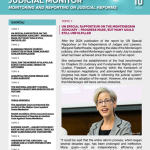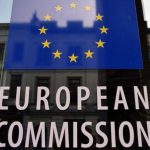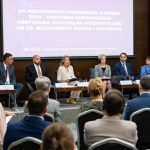
Number 10: Judicial Monitor – Monitoring and Reporting on Judicial Reforms
01/08/2025
N10.T2 – SLOBODAN PEKOVIĆ (ĆURČIĆ) CONVICTED OF WAR CRIME AGAINST CIVILIAN POPULATION
01/08/2025N10.T1 – UN SPECIAL RAPPORTEUR ON THE MONTENEGRIN JUDICIARY – PROGRESS MADE, BUT MANY GOALS STILL UNFULFILLED

HRA NEWSLETTER 10 – TOPIC 1
After the 2024 publication of the report by UN Special Rapporteur on the Independence of Judges and Lawyers, Margaret Satterthwaite, regarding the state of the Montenegrin judiciary, she visited Montenegro again in early July to assess what had been achieved since the release of her report.
She welcomed the establishment of the final benchmarks for Chapters 23 (Judiciary and Fundamental Rights) and 24 (Justice, Freedom, and Security) within the framework of EU accession negotiations, and acknowledged that “some progress has been made in reforming the judicial system” following the adoption of the report. However, she also noted that Montenegro still faces serious obstacles.
“It could be said that the entire reform process, which began several decades ago, has been prolonged and ineffective. Many goals—such as independence, efficiency and accountability—still have not been fully achieved. Judicial accountability remains one of the key objectives even three decades later”, stated Satterthwaite at the conference “Towards Judicial Independence in Montenegro – Assessment of the Implementation of the 2024 UN Special Rapporteur’s Recommendations on the Independence of Judges and Lawyers in Montenegro”, organized by the NGO Human Rights Action with the support of the UN Office of the High Commissioner for Human Rights.
She also pointed to inadequate working conditions in both the judiciary and the prosecution, institutional deadlock and political interference in the functioning of the judicial system.
“Political actors also bear responsibility—they must not claim credit for the work of the judiciary and prosecution, because only in that way can independence be preserved. Politicians must stop attacking judges—this is a global issue and a very dangerous one. In a democratic society, politicians must be accountable and refrain from such behavior,” said the UN Special Rapporteur, adding that politicians hold in their hands key issues, such as amendments to the Constitution of Montenegro.
“When we look at the status of judicial independence around the world, we can see a growing autocratization—more and more autocratic governments are attempting to influence independent judiciaries by capturing courts, limiting their capacity, instrumentalizing criminal law and targeting the independence of prosecutors, judges, individuals and lawyers,” said Margaret Satterthwaite, expressing hope that Montenegro will be a counterexample in this regard.
She expects judges to protect their integrity by not engaging in political debates, and to earn public respect through the decisions they make.
“How can we elevate the judicial and prosecutorial professions if the public doesn’t perceive them that way? How can we make these roles attractive to children, so they dream of one day holding those positions and doing that work? Of course, other countries also face these issues, as judges are often subject to public criticism. Judges themselves must be as transparent as possible—they should speak through their decisions, because judges best represent themselves through the rulings they make,” Satterthwaite concluded.
She also addressed the possibility of improving the functioning of courts and prosecutor’s offices in Montenegro, proposing modernization and the implementation of contemporary technologies.
“I hope you will embrace digitalization and make use of technologies that can help you do your jobs better. For example, you can use technology for translation, interpretation and case classification. Brazil is a good example—they had a massive case backlog, but with the help of artificial intelligence, they managed to classify cases by complexity and priority. Of course, a human translator is still needed to oversee the translation, but this technology saves both time and money”, she stated.
In conclusion, Margaret Satterthwaite stated that the Montenegrin judiciary faces serious challenges, but emphasized that strong leadership is essential to bring about change.
“To turn the vicious circle into a virtuous one,” said the UN Special Rapporteur.
HRA NEWSLETTER 10
- N10.T1 – UN SPECIAL RAPPORTEUR ON THE MONTENEGRIN JUDICIARY – PROGRESS MADE, BUT MANY GOALS STILL UNFULFILLED
- N10.T2 – SLOBODAN PEKOVIĆ (ĆURČIĆ) CONVICTED OF WAR CRIME AGAINST CIVILIAN POPULATION
- N10.T3 – TRIAL FOR THE MURDER OF SLAVOLJUB ŠĆEKIĆ CONCLUDED, VERDICT IN SEPTEMBER
- N10.T4 – ACQUITTAL FOR JUDGE MRDAK AND CLERK MARKOVIĆ
- N10.T5 – THE NATIONAL SECURITY COUNCIL DEMANDS URGENT IMPLEMENTATION OF VETTING
- N10.T6 – VESNA MEDENICA
- N10.T7 – SUPREME COURT – HIGHEST EFFICIENCY RATE IN THE LAST FIVE YEARS, TWICE AS MANY CASES RESOLVED THAN BEFORE
- N10.T8 – OVERVIEW OF THE JUDICIARY – 54 JUDGES AND 27 STATE PROSECUTORS MISSING
- N10.T9 – HOW AND WHEN JUDGES’ TERMS ENDED DUE TO MEETING THE PENSION REQUIREMENTS?
- N10.BN – BRIEF NEWS







 English
English